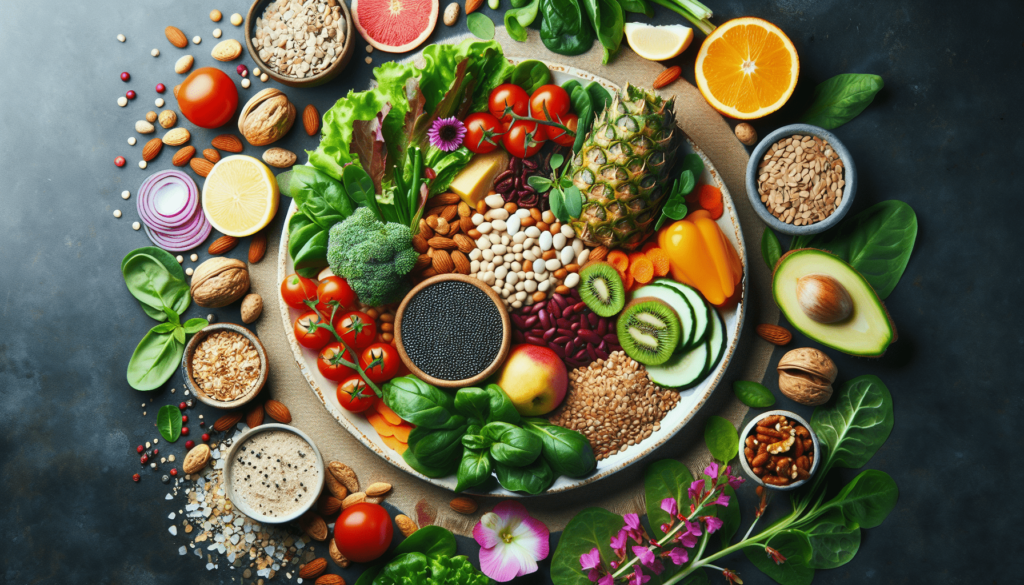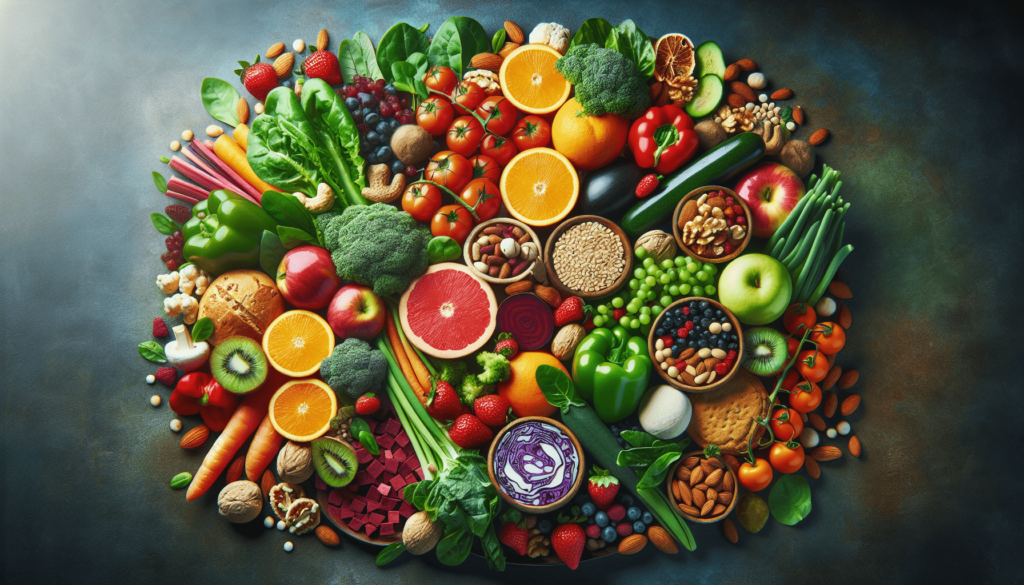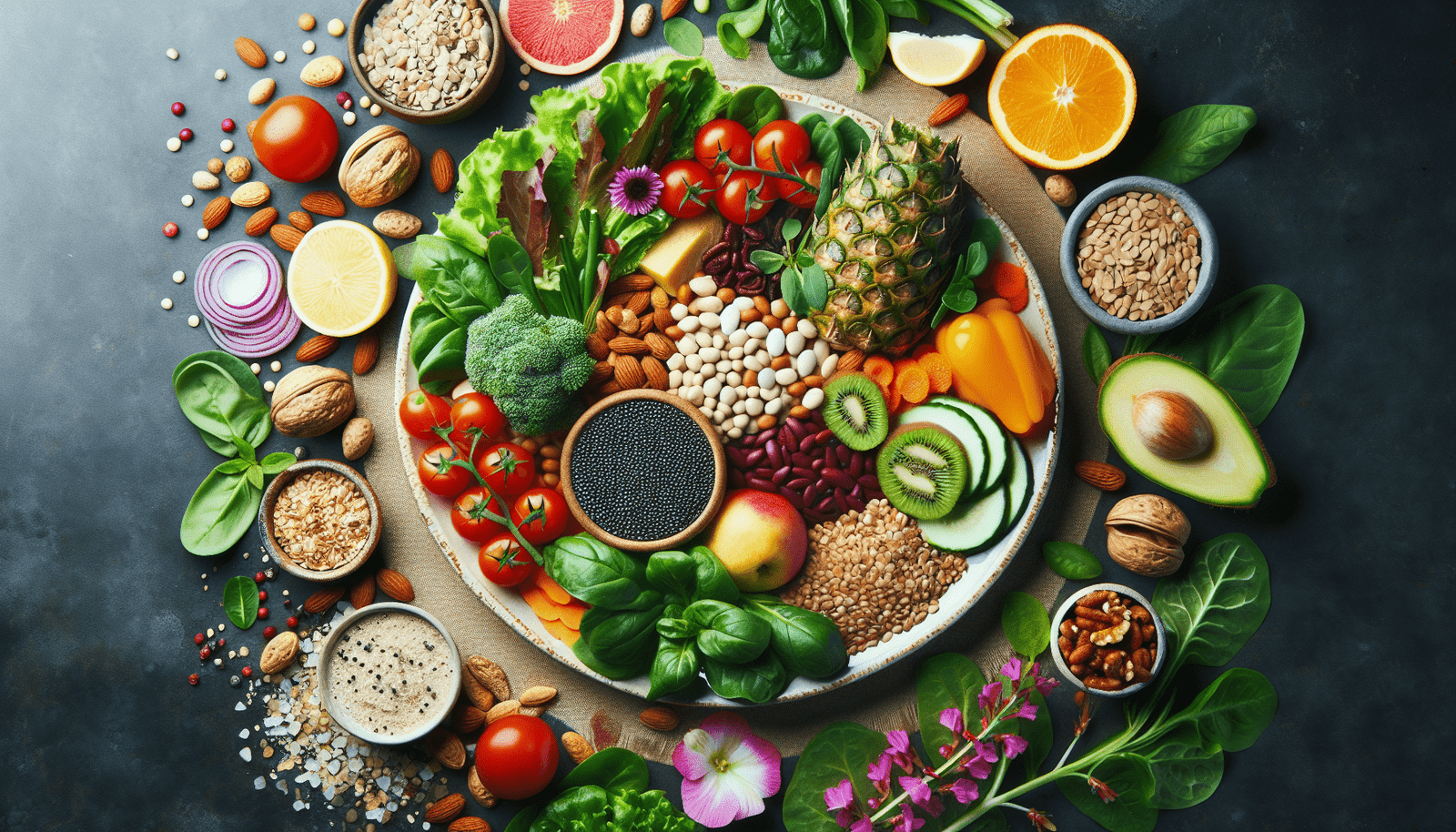Are you thinking about transitioning to a vegan diet? “Going Vegan: Nutritional Considerations And Adaptations” is here to help you navigate through the potential challenges and provide valuable insights. This article explores the essential nutritional aspects to consider when adopting a vegan lifestyle and offers practical tips to ensure your body receives all the necessary nutrients. Whether you are curious about the health benefits of a plant-based diet or simply looking to make a positive change, this article will guide you towards a well-balanced and fulfilling vegan journey.
Choosing a Vegan Diet
A vegan diet, which excludes all animal products, has been gaining popularity for its potential benefits to both individuals and the planet. By choosing a vegan lifestyle, you can make a positive impact on your health, animal welfare, and the environment. Let’s explore the various aspects of a vegan diet and how you can ensure you meet your nutritional needs while enjoying the benefits it offers.
Benefits of a Vegan Diet
Adopting a vegan diet can bring numerous benefits to your health. Studies have shown that vegans tend to have lower risks of heart disease, high blood pressure, type 2 diabetes, and certain types of cancer. A well-planned vegan diet, rich in fruits, vegetables, whole grains, legumes, and nuts, provides an abundance of fiber, antioxidants, and essential vitamins and minerals. This nutrient-dense approach helps you maintain a healthy weight and promotes overall well-being.
Ethical Considerations
For many people, choosing a vegan diet is driven by ethical considerations. It allows you to align your dietary choices with your values by avoiding the consumption of animal products. By not consuming meat, dairy, eggs, and honey, you contribute to reducing animal suffering and exploitation. Choosing plant-based alternatives instead promotes a compassionate approach towards animals and their rights.
Environmental Impact
One of the key reasons for choosing a vegan diet is its positive impact on the environment. Animal agriculture is a significant contributor to greenhouse gas emissions, deforestation, water pollution, and depletion of natural resources. By eliminating animal products from your diet, you can significantly reduce your carbon footprint and help combat climate change. Opting for a vegan lifestyle is a sustainable choice that benefits the planet and future generations.
Meeting Nutritional Needs
A well-balanced vegan diet can meet all your nutritional needs. However, certain nutrients require special attention to ensure adequacy. Let’s focus on some key nutrients that need consideration when following a vegan diet.
Protein Sources on a Vegan Diet
Protein is an essential macronutrient that plays a crucial role in tissue repair, enzyme production, and hormone synthesis. Contrary to common misconceptions, it is entirely possible to meet your protein needs on a vegan diet. Plant-based protein sources include legumes (such as beans, lentils, and chickpeas), tofu, tempeh, seitan, edamame, quinoa, and various nuts and seeds. By incorporating a variety of these protein-rich foods into your meals, you can easily meet your daily protein requirements.
Iron and Zinc Sources
Iron and zinc are important minerals involved in various biological processes in your body. While animal products can be rich sources of these minerals, there are plenty of plant-based options available as well. Legumes, whole grains, tofu, fortified cereals, and seeds are excellent sources of iron in a vegan diet. To enhance iron absorption, consume iron-rich foods with a source of vitamin C, such as citrus fruits or bell peppers. For zinc, incorporate legumes, nuts, seeds, whole grains, and fortified products like breakfast cereals into your diet.
Calcium and Vitamin D Sources
Calcium is essential for maintaining strong bones and teeth, and vitamin D aids in its absorption. While dairy products are traditional sources of calcium, there are many plant-based alternatives available. Dark leafy greens, fortified plant-based milk, tofu, tempeh, almonds, and sesame seeds provide calcium in a vegan diet. Vitamin D can be synthesized through exposure to sunlight, and fortified plant-based milk, orange juice, and cereals can be sources of this vitamin.
Vitamin B12 Sources
Vitamin B12 is important for nerve function and the production of red blood cells. It is mainly found in animal products, making it a crucial nutrient for vegans to pay attention to. While plant-based foods do not naturally contain vitamin B12, fortified foods like plant-based milk, cereals, and nutritional yeast can be excellent sources. However, it is recommended to regularly supplement with vitamin B12 to ensure adequate intake.
Omega-3 Fatty Acids Sources
Omega-3 fatty acids play a vital role in brain health and reducing inflammation. While fatty fish is a common source of omega-3s, vegans can obtain these essential fatty acids from plant-based sources. Flaxseeds, chia seeds, hemp seeds, walnuts, and algae-based supplements are rich in an omega-3 fatty acid called alpha-linolenic acid (ALA). The conversion of ALA to the active forms of omega-3s (EPA and DHA) can be limited in the body, so considering algae-based supplements can ensure sufficient intake.

Ensuring Adequate Protein Intake
Protein is an essential component of any diet, and meeting your protein needs on a vegan diet is achievable with proper planning and consideration.
Complete Protein Sources
While plant-based proteins may not be complete on their own, meaning they lack one or more essential amino acids, you can easily achieve complete protein intake by combining different plant protein sources. For example, combining legumes with grains or legumes with nuts/seeds can provide all the essential amino acids your body needs. By incorporating a variety of plant proteins into your meals and snacks, you can ensure you’re consuming a complete range of amino acids.
Combining Plant Proteins for Completeness
To ensure complete protein intake, prioritize combining plant-based sources that complement each other in terms of essential amino acids. For instance, pairing beans with rice or lentils with quinoa creates complete proteins. Including a variety of plant protein sources in your meals allows you to obtain all the essential amino acids your body requires for optimal health.
Calculating Protein Needs
Individual protein needs vary based on factors such as age, sex, and activity level. As a general guideline, most adults need around 0.8 grams of protein per kilogram of body weight. However, athletes and individuals with higher protein requirements may need more. Calculating your protein needs with the help of a registered dietitian or utilizing online resources can ensure you meet your individual needs while following a vegan diet.
Plant-Based Iron and Zinc Sources
Iron and zinc are essential minerals that are abundant in many plant-based foods. By including a variety of these foods in your diet, you can ensure you obtain adequate amounts of iron and zinc.
Iron from Legumes and Whole Grains
Legumes, including beans, lentils, and chickpeas, are excellent sources of iron in a vegan diet. They are not only rich in iron but also provide fiber and other important nutrients. Additionally, whole grains like quinoa, amaranth, and brown rice can contribute to your daily iron intake. By incorporating these nutritious foods into your meals, you can easily meet your iron requirements.
Enhancing Iron Absorption
To enhance the absorption of iron from plant-based sources, it’s important to consume vitamin C-rich foods alongside iron-rich foods. Including citrus fruits, tomatoes, bell peppers, and leafy greens in your meals can significantly improve iron absorption. On the other hand, consuming foods and beverages high in tannins, such as tea and coffee, can inhibit iron absorption. Therefore, it’s beneficial to avoid consuming these within an hour of consuming iron-rich foods.
Zinc Sources on a Vegan Diet
Zinc is abundant in various plant-based foods, ensuring that vegans can meet their requirements without difficulty. Legumes, whole grains, nuts, seeds, and fortified products can all contribute to your daily zinc intake. By including a variety of these foods in your meals and snacks, you can obtain sufficient amounts of zinc on a vegan diet.

Obtaining Calcium and Vitamin D
Calcium and vitamin D are essential for maintaining strong bones and overall health. While these nutrients are commonly associated with dairy products, there are numerous plant-based options available to meet your needs on a vegan diet.
Plant-Based Calcium Sources
Plant-based foods can provide an excellent source of calcium. Dark leafy greens, such as kale and collard greens, are rich in calcium and can be easily incorporated into salads, stir-fries, or smoothies. Additionally, calcium-fortified plant-based milk alternatives like almond milk, soy milk, and oat milk provide calcium without the need for dairy products. Including calcium-rich plant foods in your meals ensures you meet your calcium needs as a vegan.
Absorption of Calcium from Plants
While plant-based calcium sources are abundant, some plant compounds can inhibit calcium absorption. Oxalates, found in foods like spinach and beet greens, and phytates, found in whole grains and legumes, can reduce the bioavailability of calcium. To mitigate this, it’s beneficial to include a variety of plant-based calcium sources and ensure they are consumed as part of a well-balanced diet.
Vitamin D Synthesis
Vitamin D plays a crucial role in calcium absorption and bone health. While vitamin D can be synthesized by the body through exposure to sunlight, individuals living in regions with limited sun exposure or during winter months may struggle to meet their vitamin D needs. In such cases, incorporating vitamin D-fortified foods into your diet can help ensure adequate intake. Plant-based milk alternatives, orange juice, and breakfast cereals are often fortified with vitamin D, making them convenient options for meeting your requirements.
Vitamin D-Fortified Foods
Fortified foods can provide an additional source of vitamin D for vegans. When choosing fortified foods, it’s important to check the labels to ensure they are suitable for a vegan diet. Many plant-based milk alternatives, as mentioned earlier, are fortified with vitamin D. Including these fortified foods as part of your daily diet can help you maintain optimal vitamin D levels.
Vitamin B12 Considerations
Vitamin B12 is a vital nutrient that plays a key role in the production of red blood cells and the proper functioning of the nervous system. As a vegan, it’s essential to pay special attention to your vitamin B12 intake.
The Importance of Vitamin B12
Vitamin B12 is naturally present in animal products, making it a nutrient of concern for vegans. Adequate vitamin B12 intake is crucial for preventing deficiencies that can lead to anemia and neurological issues. While some plant-based foods are fortified with vitamin B12, it is generally recommended for vegans to supplement with vitamin B12 to ensure sufficient intake.
Sources of Vitamin B12 for Vegans
Fortified plant-based foods can provide vitamin B12 for vegans. These include plant-based milk alternatives, breakfast cereals, and nutritional yeast. However, it is important to read labels carefully and ensure the products you choose are fortified with vitamin B12. These fortified foods can contribute to your vitamin B12 intake, but it’s still recommended to supplement to ensure you meet your daily requirements.
Supplementing with Vitamin B12
To ensure you’re meeting your vitamin B12 needs, it is advisable to take a daily or weekly vitamin B12 supplement. There are various supplement forms available, including tablets, capsules, and sublingual (under the tongue) sprays. Consult with a healthcare professional or registered dietitian to determine the appropriate dosage and frequency based on your individual needs.
Omega-3 Fatty Acids on a Vegan Diet
Omega-3 fatty acids are essential fats that play a crucial role in brain health, reducing inflammation, and supporting overall well-being. While fatty fish is a common source of omega-3s, vegans can obtain these essential fatty acids from plant-based sources.
Sources of Plant-Based Omega-3s
Plant-based sources of omega-3s primarily contain a fatty acid called alpha-linolenic acid (ALA). Flaxseeds, chia seeds, hemp seeds, and walnuts are excellent sources of ALA. By incorporating these foods into your meals and snacks, you can easily obtain a sufficient amount of ALA and promote optimal omega-3 intake.
Conversion of Alpha-Linolenic Acid (ALA)
It’s important to note that the conversion of ALA, the plant-based omega-3 fatty acid, to the active forms of omega-3s (EPA and DHA) can be limited in the body. Therefore, it may be beneficial to consider algae-based omega-3 supplements, which provide EPA and DHA directly from a vegan source. These supplements ensure adequate intake of these specific omega-3 fatty acids.
Balancing Macronutrients
A well-balanced vegan diet should consider the appropriate distribution of macronutrients – carbohydrates, protein, and fats.
Caloric Needs on a Vegan Diet
Caloric needs vary depending on factors such as age, sex, weight, and physical activity level. It’s important to determine your individual caloric needs to sustain optimal health and energy levels. Online calculators or consultation with a registered dietitian can help you estimate your caloric intake goals based on your specific circumstances.
Balancing Carbohydrates, Protein, and Fats
A balanced vegan diet should include an adequate amount of carbohydrates, protein, and healthy fats. Aim to include a variety of whole grains, legumes, fruits, vegetables, nuts, and seeds in your meals to ensure you’re obtaining a diverse range of nutrients. Prioritize whole food sources, minimize processed foods, and consider the nutritional balance of your meals to optimize your macronutrient intake.
Meal Planning for Vegans
Meal planning is essential for ensuring you receive all the necessary nutrients on a vegan diet. By creating balanced meals and incorporating a variety of plant-based foods, you can enjoy a diverse and satisfying vegan lifestyle.
Creating Balanced Meals
When planning your meals, ensure they contain a good balance of complex carbohydrates, plant proteins, healthy fats, and an array of fruits and vegetables. Prioritize whole, minimally processed foods to maximize nutrient intake. Consider experimenting with different flavors, textures, and cooking techniques to keep your meals interesting and enjoyable.
Variety and Diversity in Plant-Based Diets
Embrace the variety and diversity that plant-based diets offer. By incorporating different types of fruits, vegetables, grains, legumes, nuts, and seeds, you can ensure you’re receiving a wide range of essential vitamins, minerals, and phytonutrients. Experimenting with new recipes and ingredients not only adds excitement to your meals but also helps expand your palate and nutritional intake.
Adapting to a Vegan Lifestyle
Transitioning to a vegan lifestyle can be a journey, and it’s important to approach it with a mindset of adaptability and positivity. Focusing on the following factors can support you on your vegan journey.
Gradual Transition or Immediate Change
Decide whether you prefer a gradual transition or an immediate change to a vegan lifestyle. Some individuals find it helpful to gradually eliminate animal products from their diet, while others may prefer to make a swift switch. Choose an approach that aligns with your personal preferences and goals.
Seeking Support and Community
Finding support and connecting with like-minded individuals can enhance your vegan experience. Look for vegan communities, online forums, or local meetup groups to share your journey, exchange recipes, and gain insights from others who have already embraced a vegan lifestyle. Engaging with a supportive community can help you feel motivated, inspired, and knowledgeable.
Navigating Social Settings
Social settings may present challenges when following a vegan diet, especially if the majority of people around you consume animal products. Being prepared, communicating your dietary choices with others, and offering to bring a vegan dish to gatherings can help navigate these situations smoothly. Remember, your decision to follow a vegan lifestyle is personal, and staying true to your values is worth the effort.
As you embark on your vegan journey, keep in mind that nutrition is an integral part of maintaining a healthy and sustainable lifestyle. By understanding the potential benefits, nutritional considerations, and adaptations necessary for a vegan diet, you can thrive while making a positive impact on your health, animal welfare, and the environment. Enjoy the journey of discovering delicious plant-based foods and the satisfaction of living a compassionate and eco-friendly lifestyle.

